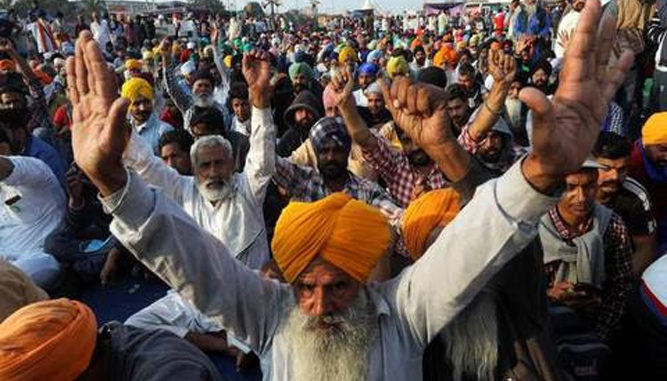

Some BJP leaders went as far as to call the protesting farmers anti-nationals. It is quite bizarre to hear folks who have abstained during the Independence struggle against the British calling the people of Punjab who shed more per capita blood than anyone else defending India‘s soil as anti-national!
This is the mechanism that has been removed in favor of the Ambanis of the world, who have already taken over all other Industry and Business sectors and demanded that the Government must cow down to do the same in the agricultural sector. It is tragic, to say the least, that a democratic government that is supposed to serve all the people ramming through legislation with minimal discussion and no input from farmers. It is reported that 45 farmers commit suicide each day in India. These new laws may only aggravate that situation and increase their plights. Moreover, without the farming community’s active cooperation and support, India would never succeed in shifting to a more efficient, sustainable, and productive farming.
What has motivated hundreds of thousands of farmers to leave their homes braving harsh winter and the ongoing coronavirus pandemic to travel to New Delhi to protest the newly enacted Farm laws? This unrelenting protest is not like any other as they have come to the capital’s perimeter with their tractors and food supplies for a long-haul wait. The farmers are protesting these new laws because they honestly believe that it would do irreparable harm to their livelihood, and in the end, they might be sacrificed at the altar of corporate interests. On the other hand, the BJP government remains adamant in sustaining the laws in their current form. Some BJP leaders went as far as to call the protesting farmers anti-nationals. It is quite bizarre to hear folks who have abstained during the Independence struggle against the British calling the people of Punjab who shed more per capita blood than anyone else defending India’s soil as anti-national!
Obviously, the farmers simply do not trust this Government as it has repeatedly failed to keep their promises. Unlike the United States, India does not provide any subsidies to the farmers. However, the current system guarantees farmers a set price for their products, which is known as Minimum Support Pricing (MSP). Although nowhere in the bills is there any mention of removing the MSP, the farmers fear that their worst nightmares might come true. The Modi government continues to assure them that it will preserve the existing mechanism. However, nobody can blame the farmers for their skepticism and uneasiness as they have not forgotten the broken promises from the past.
Prior to the 2014 elections, Narendra Modi had campaigned on the promise that if voted to power, his Government would implement M.S. Swaminathan’s recommendations according to which farmers were to be paid 50% over and above the cost of the crop as the MSP. In the words of Modi, “We will change Minimum Support Price. There will be a new formula – the entire cost of production and a 50% profit.” However, they have not only reneged on that promise but went about filing an affidavit in February 2015 opposing it in the Supreme Court. It was a cruel joke played on the farmers and exposed the Modi Government’s anti-farmer policies at the Centre and Khattar-led BJP Government’s in Haryana. Besides, farmers have not forgotten the police firing and killings in Madhya Pradesh that took place in 2017.
Thanks to the Nehruvian vision and the successive Congress governments’ policies that led to the green revolution, India’s food storage facilities are overflowing with food grains today; however, some would argue that India is not keeping up with changing times. The nation has just witnessed the distribution of free food grains during these pandemic times to those poor laborers walking back to their home villages due to the Government’s draconian lockdown. Lest we forget the great famine in the 1940s, an empty granary would have led to another disastrous famine and social unrest in India. Suppose the current enacted provisions of the farm laws are fully implemented, it may eventually dry up the storage of foods in Government facilities and may even do away with ‘Food Corporation of India’ in favor of the corporate interests.
The existing Agricultural Produce Market Committee (APMC) system may need reforming, but 425 of them plus 1400 or so purchasing centers are doing their job of buying, storing, and forwarding those food grains to buyers across India. These APMCs include farmers, Traders, Agricultural experts, and others, contributing to purchasing decisions. If they fail to meet a threshold in pricing, farmers currently have the option to sell that to the Government for the Minimum Support Price.
This is the mechanism that has been removed in favor of the Ambanis of the world, who have already taken over all other Industry and Business sectors and demanded that the Government must cow down to do the same in the agricultural sector. Therefore, it would be difficult to argue that these laws are enacted primarily for the benefit of the farmers other than serving the interests of these crony capitalists with little or no social concern or moral compass to accumulate more wealth at any cost to the society-at-large. It is to be noted as well that in these pandemic times when other sectors are showing a downward trend, they are casting their eye on the food grains to make up for the losses.
There is no empirical evidence to prove that getting rid of the Essential Commodity Act will help farmers with more income or stabilize the prices for consumers. Under the new laws, corporates will stock any amount and dispense it entirely at their discretion without any accountability to the public, allowing outlets like Reliance or Amazon to exploit the supply and demand situation to engage in price gouging. These changes will significantly impact small farmers because of their low output that may disallow any bargaining power.
Through this amended law, the Government gives up its power to prevent hoarding and controlling price inflation. Mr. P. Sainath, journalist, and founder of People’s archive of Rural India, said that Businesses tend to undertake buying only when it is profitable in explaining why privatization of Bihar’s agricultural markets has not increased farmer’s income or improved infrastructure. The recent pandemic in the U.S. also showed how the prices were manipulated to maximize these online entities’ profits. There will also be a massive shift in power in favor of Corporates regarding what type of crops the farmers are supposed to plant. One of the other provisions in the law had also limited the farmer’s ability to seek justice before the courts but instead empowered a District collector for providing relief.
Sudan, a country in East-Central Africa, has been beset with civil war and famine for quite an extended period. It has been in deep distress with accumulating debt from borrowings for development programs and poverty reduction. Sudan needed to raise foreign exchange to pay back their mushrooming debt. What were the expert solutions from the reputed world bodies like the IMF and World Bank? Grow cotton on their Nile Delta where they could have grown wheat or Rice to feed the nation. When the cotton was ripe for picking, the prices in the world market plummeted, and they neither had food nor foreign exchange but was placed under the mercy of agencies like WFP. To the rest of the world, it is a lesson hard-learned.
Economists generally agree that India’s agricultural sector needs reforms, and their food storage facilities do require better upkeep to limit unnecessary losses of the food crops due to degradation and rot. However, the need of the hour for the Government is to hear the grievances of the protesting farmers and address their concerns. It is tragic, to say the least, that a democratic government that is supposed to serve all the people ramming through legislation with minimal discussion and no input from farmers. It is reported that 45 farmers commit suicide each day in India. These new laws may only aggravate that situation and increase their plights. Moreover, without the farming community’s active cooperation and support, India would never succeed in shifting to a more efficient, sustainable, and productive farming.
(The author is a former Chief Technology Officer of the United Nations and the Vice-Chairman of the Indian Overseas Congress, USA)





Be the first to comment